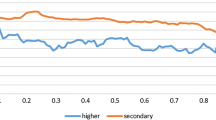Abstract
Drawing upon recent literature on educational inflation, overeducation, and the diploma disese, this paper examines analytically both the positive and negative aspects of degreeism in developed as well as in developing nations. Some of the positive effects of degreeism found are, for example, (1) a positive employment effect, (2) a proxy information effect, and (3) ritualistic effects. Among the major negative effects of degreeism discussed are (1) economic waste, (2) imbalance between job expectations and labor market realities, and (3) consumer deceit. Finally, alternative policy suggestions are presented for addressing the problem of degreeism. Some of the policies discussed are the degree tax, incomes policy, improved labor market information services, and modified civil service procedures. The major implication of such policies is to direct attention to the real issue of competency, not diplomas.
Similar content being viewed by others
References
Arnove, R. (1980). “Comparative education and world-systems analysis”Comparative Education Review 24: 48–62.
Arrow, K. (1972). “Higher education as a filter,”Technical Report No. 71. Stanford: Institute for Mathematical Studies in the Social Sciences.
Bowles, S. (1972). “Schooling and inequality from generation to generation,”Journal of Political Economy 80: s219-s251.
Cardoso, F. E. (1977). “The consumption of dependency theory in the United States,”Latin American Research Review 12: 7–24.
Dore, R. (1976).The Diploma Disease. Education, Qualification and Development. Berkeley: University of California Press.
Feldman, K. and Newcomb, T. (1969).The Impact of College on Students, I and II. San Francisco: Jossey-Bass.
Frank, A. G. (1972). “Sociology of development and underdevelopment of sociology,” in J. Cockcroft et al. (eds.).Latin America's Political Economy. New York: Doubleday.
Freeman, R. (1976).The Overeducated American. New York: Academic Press.
Friedman, M. (1962).Capitalism and Freedom. Chicago: University of Chicago Press.
Goldstein, M. (1978). “An academic's Pentagon interlude,”International Studies Notes 4: 4–7.
Hutchins, R. (1968).The Learning Society. New York: Mentor.
Inkeles, A. and Smith, D. (1974).Becoming Modern. Cambridge: Harvard University Press.
Klapp, O. (1969).Collective Search for Identity. New York: Holt, Rinehart and Winston.
Levin, H. (1978). “The dilemma of comprehensive secondary school reforms in Western Europe,”Comparative Education Review 22: 434–451.
Levin, H. (1980). “Teacher certification and the economics of information,”Educational Evaluation and Policy Analysis 2: 5–18.
Levy, M. (1966).Modernization and the Structure of Societies. Princeton: Princeton University Press, 2 vols.
Milner, M. (1972).The Illusion of Equality, the Effects of Education on Opportunity, Inequality, and Social Conflict, San Francisco: Jossey-Bass.
National Economic and Social Development Board, Thailand (1978). “Khru baan nog maj chaj pen kan ngaaj” (The difficulty of getting a job as a rural teacher),Journal of the National Economic and Social Development Board 15: 31–37.
National Education Commission, Thailand (1974).Education for Life and Society: A Report of the Committee for Establishing the Framework for Educational Reform. Bangkok: National Education Commission.
Pareto, V. (1966).Sociological Writings. New York: Praeger.
Prewitt, K. and Stone, A. (1973).The Ruling Elites: Elite Theory, Power and American Democracy. New York: Harper and Row.
Provincial Administrative Organization—Ubol, Thailand (1978). “Khuj kab pyuan khruu” (Discussions with teachers),Pyuan Khruu Ubol 9: 3–4.
Sarkar, N. (1974).Industrial Structure of Greater Bangkok. Bangkok: United Nations Institute for Economic Development and Planning.
Author information
Authors and Affiliations
Rights and permissions
About this article
Cite this article
Fry, G.W. degreeism: Disease or cure?. High Educ 10, 517–527 (1981). https://doi.org/10.1007/BF01676899
Issue Date:
DOI: https://doi.org/10.1007/BF01676899




